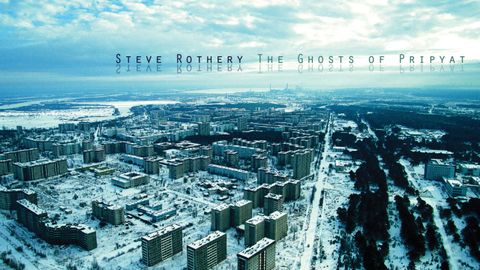Pripyat is an abandoned city in Ukraine.
Its young population of 50,000 (average age: 26) was evacuated in April 1986 after the nearby Chernobyl nuclear disaster. Now in what’s called The Zone Of Alienation, it can be visited on guided tours – it’s considered ‘relatively’ safe – but many buildings, long vandalised, are collapsing, or flooded. Some have trees growing inside them.
Such resonant post-apocalyptic imagery lends itself to a monster of a prog album. That Steve Rothery manages to evoke the gravitas and grandeur of its psycho-geographical ghosts via the medium of instrumentals is a credit to the scale and ambition of his music.
Rothery, of course, is the Marillion founder member who once cited Gilmour, Hackett and Latimer as his influences, and now resides on an almost comparable level in the guitarists’ pantheon. Indeed, both Steve Hackett and Steven Wilson guest on this album.
The very definition of ‘long-awaited’, it follows a 2013 live album from Plovdiv which premiered some of these tracks. Rothery was first invited to record a solo venture as far back as 1985, but has since detoured through The Wishing Tree, as well as being perennially busy with Marillion’s longevity. Now, thanks to the right musicians (co-writer and guitarist Dave Foster, bassist Yatim Halimi, drummer Leon Parr and keyboardist Riccardo Romano) and a successful Kickstarter campaign, the waiting ends.
Recorded at Real World, the album arrives as a CD or a DVD digipak (with documentary footage and four tracks recorded live), but it’s the music, the heart and essence of it, that we’ll discuss here. Seven lengthy tracks offer a gently moving wash of melancholy and often euphoric crescendos as the band glide through deft and dynamic phases.
Opener Morpheus sets the tone, easing in like classic Floyd then subtly, almost imperceptibly, building, without ever overloading. Hackett (with whom Rothery has guested live) pays an early visit. It’s fair to say the formula is, in the main, observed over the other tracks. The longest, The Old Man Of The Sea, does shift gears more heatedly, with outstanding keyboard curveballs and an emotive solo from Wilson. If you like duelling guitars, this is Ali vs Frazier. Yesterday’s Hero has a Knopfler-doing-Celtic feel, while on the languid Summer’s End there’s a hint of Neil Young’s Crazy Horse.
An album that invites rather than incites, Rothery’s ripples here seem closer in spirit to early Marillion than to the band’s recent work. Its guitar-hero stylings are both tasteful and taut. Some ghosts are highly welcome.


